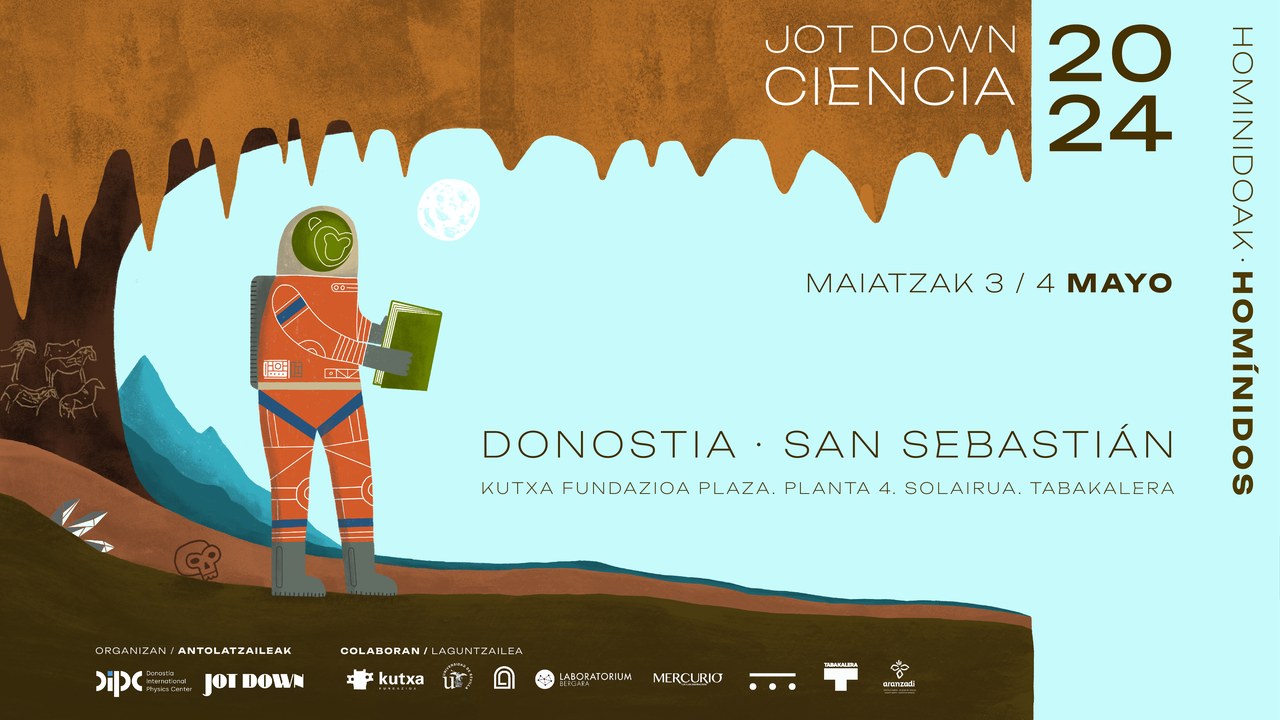Hominids featuring prominently in the Jot Down Science Event to take place in Donostia

Donostia-San Sebastian (Basque Country). 29 April, 2024. Organised by the well-known Jot Down magazine and the Donostia International Physics Center (DIPC), the eleventh edition of the Jot Down Science event is taking place in Donostia/San Sebastian on 3 and 4 May, and has the special collaboration of the Kutxa Fundazioa. Hominids, the primate family including modern humans (Homo sapiens) and their direct ancestors, as well as other closer extinct relatives, form the backbone of this year's event.
The event, which is open to the general public, will be taking place in Tabakalera’s Kutxa Fundazioa Plaza and will be bringing together top researchers in the field of palaeoanthropology, archaeology and human evolution; a dynamic programme includes papers, book presentations, round table discussions and a workshop for children and families.
A wide range of topics will be covered during this conference on hominids. In their papers, researchers and specialists and nationwide popularisers will be sharing their knowledge about the evolution of the brain and vision in hominids, the change of paradigm with the emergence of agriculture, the fascination for crystals, or the social tensions between care and violence throughout our history. On Friday, the programme also features a round table on art and science, as well as the prize-giving ceremony in the 2024 Jot Down Science competition.
Books take centre stage during the second day on Saturday with interviews with Juan José Gómez-Cádenas, author of the recently published science fiction novel Nación Neandertal (Espasa, 2024), and Juan Ignacio Pérez-Iglesias, author of the popular science book Primates al este del edén (Crítica, 2024). Over the two days of the event, an exhibition and sales space for popular science books will be set up in Tabakalera; it will feature the main titles by the researchers taking part in the conference, plus a selection of publications by Jot Down and the DIPC.
In the special workshop run on the Saturday morning, assisted by specialists from the Aranzadi Zientzia Elkartea (Aranzadi Society of Sciences), children will be able to learn how to compare skeletal remains of animals, such as lions and gorillas, with replicas of hominid remains.
The conference is free of charge; the afternoon lectures are open to everyone, but the children's workshops require registration via the DIPC website.
Jot Down Science Popularisation Competition
As every year, the prize-giving ceremony of the 2024 Jot Down Science competition on popular science will take place during the event. The theme selected for the eleventh edition of the competition was hominids, with four categories of participation –best popular science essay, best science fiction narrative text, best scientific illustration and best scientific photograph– each with a prize of €1,000 and sponsored by the DIPC and Jot Down, the University of Seville, the Canfranc Underground Laboratory and the Bergara Laboratorium.
A total of 70 pieces of work were submitted across the four categories. The winner in the category of best popular science essay was Juan Manuel Jiménez-Arenas, lecturer in Prehistory and Archaeology at the University of Granada, who was awarded the prize for his work Orce: piedras que se asemejan a huesos (Orce: stones that resemble bones). In the category of best science fiction narrative, the joint winners were Juan Carlos Pereletegui from Alicante for his work Madres (Mothers) and Rebeca García-Nieto from Guadalajara for her work Un edén improbable (An Improbable Eden). The prize in the category of best scientific illustration went to Andrés Diam for his work entitled El primer paso (The First Step). Finally, the prize for best scientific photograph went to Jose Conceptes from Castellón for his work Metamorfosis homínida.
Mercurio magazine, Next Door Publishers, Tabakalera and the Aranzadi Zientzia Elkartea (Aranzadi Society of Sciences) are also collaborating in the competition and event.
